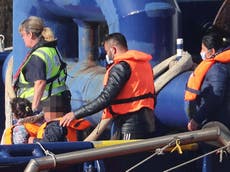How Britain’s far right is trying to capitalise on Channel crossings
Seeking Refuge: Extremists are ‘clinging to’ the issue after coronavirus disrupted their normal activities, experts tell Lizzie Dearden

Your support helps us to tell the story
From reproductive rights to climate change to Big Tech, The Independent is on the ground when the story is developing. Whether it's investigating the financials of Elon Musk's pro-Trump PAC or producing our latest documentary, 'The A Word', which shines a light on the American women fighting for reproductive rights, we know how important it is to parse out the facts from the messaging.
At such a critical moment in US history, we need reporters on the ground. Your donation allows us to keep sending journalists to speak to both sides of the story.
The Independent is trusted by Americans across the entire political spectrum. And unlike many other quality news outlets, we choose not to lock Americans out of our reporting and analysis with paywalls. We believe quality journalism should be available to everyone, paid for by those who can afford it.
Your support makes all the difference.Videos viewed by millions of people have shown men storming into hotels housing asylum seekers and banging on bedroom doors, demanding to know where the people inside are from. Meanwhile, activists “patrol” the Kent coast, waiting to film migrants being brought ashore. But why are far-right groups trying to spread anger and panic over English Channel crossings?
Extremists are “clinging to” the issue as a means to gain publicity and recruits after the coronavirus pandemic distracted the public from their normal causes, according to experts spoken to by The Independent as part of the series – funded by our Supporter Programme – on refugees trying to start a new life in the UK.
Channel crossings have united different strands of the far-right, from milder “cultural nationalists” who claim to only oppose Islamist extremism, to neo-Nazis who want a white only Britain.
Several groups have seized the opportunity for publicity, including Britain First, whose leader Paul Golding was convicted of a terror offence earlier this year.
How to support truly independent investigations
This article was funded by our supporters. If you would like to see more of this important work, please make a contribution at independent.co.uk/donations
The Anti-Islam For Britain party, which was founded by failed Ukip leadership candidate Anne Marie Waters, has also been focusing on Channel crossings. English Defence League (EDL) founder Tommy Robinson has been promoting videos by a blogger who calls himself Active Patriot and has been filming both hotels and migrants arriving in Dover.
A former EDL activist, Glen Saffer, is among the members of a group called South East Coastal Defence, which has circulated a list of hotels and called for “scum” migrants to be “sent back” on its official Telegram channel.
Matthew Collins, the head of intelligence at Hope Not Hate, said the activity was part of a wider trend where far-right groups claim to “expose” scandals and conspiracies.
“The far right in this country survives on scandals, they survive on things that fall into their lap,” he told The Independent. “They don’t really have anything to cling to at the moment… the lockdown and conspiracy theories going through the roof is a godsend to the far right.”
Cristina Ariza, who is a research analyst at Tony Blair institute for Global Change, said extremist groups were “opportunistic”.
“We’ve seen Britain First taking advantage of [Channel crossings] to promote their rhetoric and get maximum coverage,” she added.
The group’s activity, particularly in hotels, has generated a significant number of negative news articles, which it has shared gleefully through its own channels.
Britain First has also tried to publicise the police response to protests and the arrest of activists to further claims it is persecuted by the state. Mr Collins said that asylum seekers were “low-hanging fruit” to stoke racism and xenophobia.
“Putting refugees in four-star hotels is a difficult thing to justify and we have a government that doesn’t seem particularly bothered about justifying it,” Mr Collins added. “All we’ve heard from Priti Patel is how tough she’s going to be on these people.”
Giving evidence to parliament’s Home Affairs Committee last week, a counter-extremism official said that people must be able to have a legitimate debate around immigration and asylum.
But Sara Khan, who leads the Commission for Countering Extremism, added: “The distinction is when you see far-right groups exploiting that issue to deliberately engage in campaigns of hatred, dehumanising migrants and engaging in incitement and really frightening tactics against migrants, asylum seekers and refugees.”
A string of incidents, including several where Britain First managed to get inside hotels housing asylum seekers, caused the Home Office to offer assistance with physical security, such as barriers and hoarding.
It said it had a statutory duty to house asylum seekers who would otherwise be destitute, and that hotels were being used as a “contingency option” during the coronavirus pandemic.
A government spokesperson said security at asylum accommodation sites was continually reviewed.
“The government takes the wellbeing of asylum seekers and the most vulnerable in society extremely seriously, and we have taken unprecedented action to support them during the pandemic.
“Any attempts to fuel resentment towards asylum seekers and create community tension are completely unacceptable and all incidents at asylum accommodation sites are reported to the Home Office immediately. We then work with the provider to put in additional safety measures if required.”
This article was funded by our supporters. If you would like to see more of this important work, please make a contribution





Join our commenting forum
Join thought-provoking conversations, follow other Independent readers and see their replies
Comments